| Srl | Item |
| 1 |
ID:
119706


|
|
|
|
|
| Publication |
2013.
|
| Summary/Abstract |
Desiring to "engender" the written history of the Communist Party of India (CPI) and the movements it led or initiated, the author looks at the first generation of middle-class women who became communists in colonial Bengal in the period 1939 to 1948. Judging that much of the available printed and archival source material inadequately describes the role of women in the CPI, the author interviewed many of the surviving women CPI recruits and studied their printed memoirs. She examines in particular two organizations that were established in the late 1930s and early 1940s, namely, the Chhatri Sangha (Girl Students' Association) and the Mahila Atma Raksha Samity (Women's Self-Defense Association). The author contends that the recruiting and mobilizing strategies of the CPI-while focused primarily on class-also had important consequences for gender relations: many middle-class women found themselves transgressing the narrowly constructed norms of propriety and mixing with women of lower classes and working in public spaces together with men in ways the existing nationalist feminisms/nationalist conceptions of women's public activism had not made available. The author concludes that these revelations show the need to rethink stereotypes about the communist women, stereotypes built from the experiences of new generations of feminists in the 1960s and 1970s, but which seem not to have been as rigidly created or enforced in the 1940s as they were later on.
|
|
|
|
|
|
|
|
|
|
|
|
|
|
|
|
| 2 |
ID:
184626
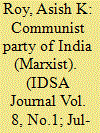

|
|
|
| 3 |
ID:
098092
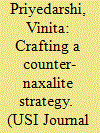

|
|
|
| 4 |
ID:
081630
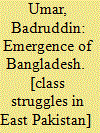

|
|
|
|
|
| Publication |
Karachi, Oxford University Press, 2007.
|
| Description |
xi, 389p.hbk
|
| Contents |
Vol 1: Class struggles in East Pakistan (1947-1958)
|
| Standard Number |
9780195795714
|
|
|
|
|
|
|
|
|
|
|
|
Copies: C:1/I:0,R:0,Q:0
Circulation
| Accession# | Call# | Current Location | Status | Policy | Location |
| 053354 | 954.9204/UMA 053354 | Main | On Shelf | General | |
|
|
|
|
| 5 |
ID:
102919
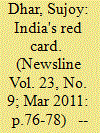

|
|
|
| 6 |
ID:
157568
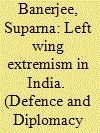

|
|
|
| 7 |
ID:
126096
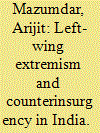

|
|
|
|
|
| Publication |
2013.
|
| Summary/Abstract |
India has a long history of left-wing extremism. The largest and most powerful left-wing extremist group today is the Communist Party of India (CPI) (Maoist), which is active in many states across the country. Its ultimate goal is to capture power through a combination of armed insurgency and mass mobilisation. In recent times, the southern state of Andhra Pradesh has achieved notable success in counterinsurgency operations against the Maoists. This article outlines the 'Andhra model', which involves a mix of security, development and political approaches. It also examines whether this model can be replicated in other Indian states affected by left-wing extremism.
|
|
|
|
|
|
|
|
|
|
|
|
|
|
|
|
| 8 |
ID:
027055
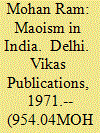

|
|
|
|
|
| Publication |
DelhI, Vikas Publications, 1971.
|
| Description |
vii, 196p.hbk
|
|
|
|
|
|
|
|
|
|
|
|
Copies: C:1/I:0,R:0,Q:0
Circulation
| Accession# | Call# | Current Location | Status | Policy | Location |
| 006076 | 954.04/MOH 006076 | Main | On Shelf | General | |
|
|
|
|
| 9 |
ID:
052512
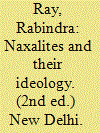

|
|
|
|
|
| Edition |
2nd ed.
|
| Publication |
New Delhi, Oxford University Press, 2002.
|
| Description |
xviii, 251p.pbk
|
| Series |
Oxford India Paperbacks
|
| Standard Number |
0195655532
|
|
|
|
|
|
|
|
|
|
|
|
Copies: C:1/I:0,R:0,Q:0
Circulation
| Accession# | Call# | Current Location | Status | Policy | Location |
| 048326 | 954.04/RAY 048326 | Main | On Shelf | General | |
|
|
|
|
| 10 |
ID:
050206
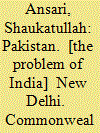

|
|
|
|
|
| Publication |
New Delhi, Commonwealth Publishers, 1997.
|
| Description |
xxvi, 120p.hbk
|
| Standard Number |
8171694268
|
|
|
|
|
|
|
|
|
|
|
|
Copies: C:1/I:0,R:0,Q:0
Circulation
| Accession# | Call# | Current Location | Status | Policy | Location |
| 039183 | 954.91/ANS 039183 | Main | On Shelf | General | |
|
|
|
|
| 11 |
ID:
115881
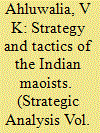

|
|
|
|
|
| Publication |
2012.
|
| Summary/Abstract |
Naxals of the Communist Party of India (CPI) (Maoist), better known as Maoists, characterised more than once by the Indian prime minister as the gravest threat to our internal security, have been continuously fine-tuning their strategies and tactics in order to maintain their relevance. On the other hand, the state too has been making concerted efforts by taking 'security and development' measures to diminish, if not altogether defeat, the challenge posed by the rebels to the Indian state.
|
|
|
|
|
|
|
|
|
|
|
|
|
|
|
|
| 12 |
ID:
132876
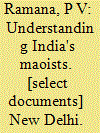

|
|
|
|
|
| Publication |
New Delhi, Pentagon Press, 2014.
|
| Description |
x, 398p.Hbk
|
| Contents |
In association with Institute for Defence Studies and Analyses (IDSA)
|
| Standard Number |
9788182748019
|
|
|
|
|
|
|
|
|
|
|
|
Copies: C:2/I:0,R:0,Q:0
Circulation
| Accession# | Call# | Current Location | Status | Policy | Location |
| 057847 | 322.420954/RAM 057847 | Main | On Shelf | General | |
| 057848 | 322.420954/RAM 057848 | Main | On Shelf | General | |
|
|
|
|
| 13 |
ID:
119707
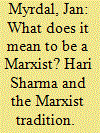

|
|
|
|
|
| Publication |
2013.
|
| Summary/Abstract |
The Hari Sharma Memorial Lecture series was instituted by the Dr. Hari Sharma Foundation for South Asian Advancement in memory of Hari Sharma, who left his estate to the Foundation when he passed away in 2010. The purpose of the series is to present scholars and writers who have made a significant contribution to the struggle for emancipation in South Asia. The first lecture in this series was presented by Jan Myrdal, one of the most prominent Swedish writers, a life-long Marxist, and for many years a friend of Hari Sharma. Myrdal wrote his first book on India, India Waits, after his visit to the "disturbed areas" of Andhra as a guest of C.P. Reddy in 1980. He visited Dandakaranya in 2010 at the invitation of the Communist Party of India (Maoist) and wrote about his conversation with the leadership of the party in Red Star over India: Impressions, Reflections and Discussions When the Wretched of the Earth Are Rising (Kolkata, 2012). Following his speaking tour after the book's release in Kolkata, Myrdal was banned from visiting India by the Government of India.
|
|
|
|
|
|
|
|
|
|
|
|
|
|
|
|